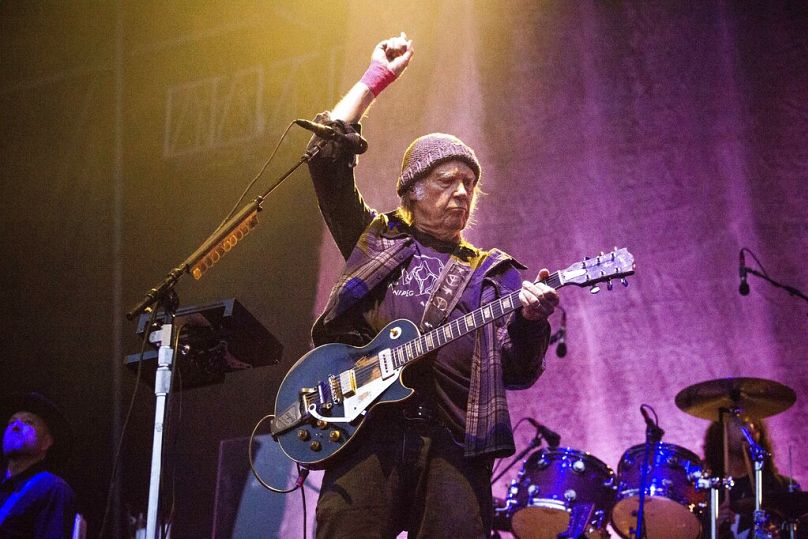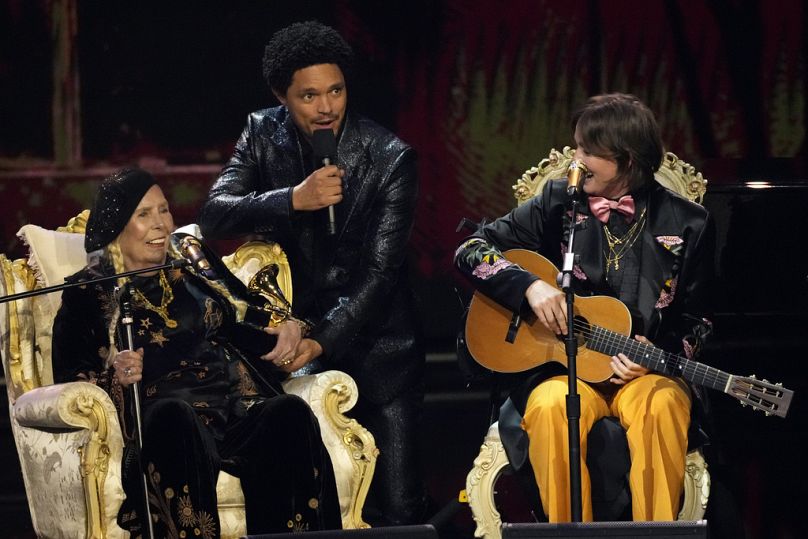As a listener, you might not care. But as an artist, it can be a tough pill to swallow to know that an algorithm, as opposed to human preference, might be behind your success or failure, Jonah Prousky writes.
Neil Young and Joni Mitchell begrudgingly returned their music to Spotify last month, two years after leaving the platform in protest of its largest podcaster, Joe Rogan.
According to Young, Rogan was using the platform to spread misinformation about the COVID-19 pandemic.
“They can have Rogan or Young. Not both,” wrote Young to his manager at Warner Music Group.
It turns out, Spotify can have both.
And, no matter what you think of Young’s protest (or boycott, or whatever it was), his clash with Spotify is a reminder that tech giants have a funny way of getting what they want and resistance from artists is usually futile.
Streaming royalties vs mouths to feed
Many creators have long been frustrated with platforms like Spotify and YouTube due to the algorithms they employ, which in part drive views and streams, and by extension, pay.
Most creators, however, don’t have the clout to issue ultimatums, nor the money to leave these platforms.
While some artists on Spotify make a decent living, “there is a far, far greater volume of artists — literally millions of them — who are struggling to make ends meet from their streaming royalties,” according to Rolling Stone.
Also, without an established audience of one’s own, artists are pretty much beholden to Spotify and YouTube for views.
According to Forbes, Spotify holds a dominant 30.5% of the music streaming market, more than double its nearest competitor, Apple Music, which has a 13.7% share. YouTube is virtually unrivalled.
Who cares, you might say, Spotify is beloved. And, hasn’t the company done a lot to democratise music?
You might have rhythm — but you have to convince the algorithm
It’s true, the company cut out a lot of the red tape associated with the legacy music business by giving new artists a direct line (and business model) for reaching listeners.
That ethos is even enshrined in the company’s mission statement, which is “to unlock the potential of human creativity by giving a million creative artists the opportunity to live off their art and billions of fans the opportunity to enjoy and be inspired by it.”
The company has done much to advance that mission. It’s capable of launching music careers in ways that never would have been possible in decades past. An artist’s streams — and by extension, earnings — can skyrocket almost overnight if their songs make it onto one of the platform's most-listened-to playlists.
It can quite literally be the difference between driving Uber and making music on the side and earning $200,000 (€187,880) in streaming royalties.
So any attempt to criticise the platform ought to be wary of what it’s done for some musicians. But, in many ways, the platform’s algorithm has homogenised music tastes around a small number of top artists, making it harder for new musicians to gain traction.
“Algorithms", wrote Scott Timberg in a column for Salon, "are about driving you closer and closer to what you already know. And instead of taking you toward what you want to listen to, they direct you toward slight variations of what you’re already consuming.”
What people are already consuming is just a small subset of Spotify’s artist base, whose tunes gobble up our collective attention.
“In 2013, the top 1% of artists accounted for over three-quarters of all revenue from recorded music sales. In that year 20% of songs on Spotify had never been streamed,” wrote Ludovic Hunter-Tilney for the Financial Times.
Maybe that’s always been the case, you’ll wonder. I mean, anyone who's seen The X Factor knows that not every artist is worthy of our attention. But the decision of what and who to listen to used to be a human one.
Is a boycott a viable option?
As a listener, you might not care, especially if you think the algorithm has a good handle on your taste. But as an artist, it can be a tough pill to swallow to know that an algorithm, as opposed to human preference, might be behind your success or failure.
So, say you’re a musician or content creator who feels the algorithm has treated you unfavourably. What are you going to do, leave? Boycott?
Well, some are. A growing wave of artists and content creators are leaving Spotify and YouTube, often for platforms like Substack and Patreon, where their earnings aren’t beholden to the algorithm.
Platforms like Substack and Patreon allow creators to “own their audience” since earnings on these platforms aren’t tied to views, rather, audience members pay creators directly and the platforms take a small cut.
Still, that move is really only viable for established artists like Young and Mitchell who have audiences.
So, if you’re just starting out as a musician or content creator, you really have no choice but to dig in your heels and hope the algorithm likes your stuff.
Jonah Prousky is a Canadian freelance writer based in London. His work has appeared in several leading publications including the Canadian Broadcasting Corporation (CBC), Toronto Star, and Calgary Herald.
At Euronews, we believe all views matter. Contact us at view@euronews.com to send pitches or submissions and be part of the conversation.














